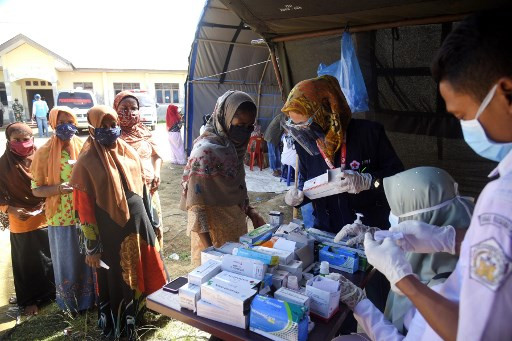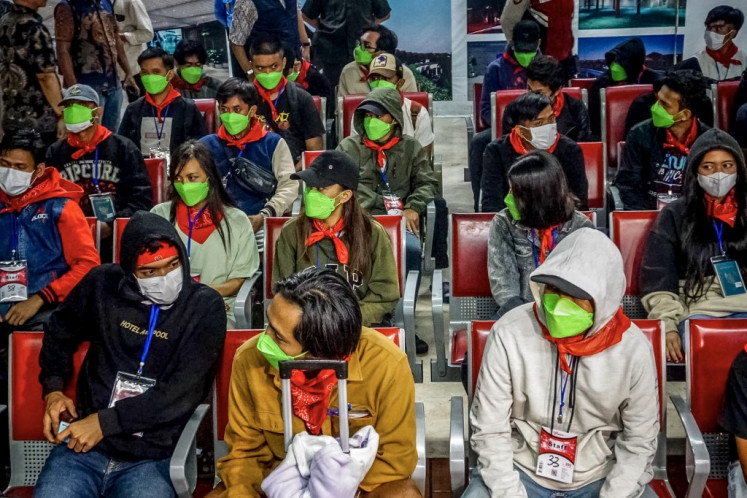Popular Reads
Top Results
Can't find what you're looking for?
View all search resultsPopular Reads
Top Results
Can't find what you're looking for?
View all search resultsWhy refugees attempt suicide in Indonesia
The actual roots of suicidal ideas include living for years with an obscure future, chronic distress over the debilitating situation of their families in conflict areas back in their country of origin, and being ostracized from the normal way of living in the host community.
Change text size
Gift Premium Articles
to Anyone
T
welve refugees have committed suicide in the past two years. Dozens of other are on the edge of suicide as hundreds of mental health cases become active monthly across refugee communities.
The latest suicide took place last March in Tanjung Pinang refugee community. Three months later, it was followed by another unsuccessful attempt. Many have linked the incidents to the recent lockdown we faced due to the high number of COVID-19 cases—nearly 200 out of 400 refugees were infected, all confined to live in a 500-square-meter area.
What underlies suicide attempts among refugees is far more profound and complicated than the pandemic alone. COVID-19 may strike refugees in a suicidal mood, but the actual roots of the suicide include living for years with an obscure future, chronic distress over the debilitating situation of their families in conflict areas back in their countries of origin, and being ostracized from the normal way of living in the host community.
Indonesia is increasingly becoming a graveyard for refugees who are taking their lives because of prolonged statelessness. According to a recent report from the United Nations High Commissioner for Refugees, 13,497 refugees live in Indonesia, and the majority sought asylum in 2013 and 2014. Each year, fewer than 5 percent of refugees get resettled to a third country.
That small likelihood of success distances the refugees from their future. As human beings, we live our present time with the perception of the future in mind and experience of the past in our behavior. Imagine, going to sleep each night with the thoughts that you cannot return to your origin country — facing the threat of guns, nor look toward a promising future, resettlement.
Living at peace in the presence of your family seems more unattainable with every day that passes. For 365 days, those thoughts might be upsetting and increasingly lead to despair. After 1,000 days, those thoughts move beyond upset and despair to depression—and from there finding relief in a rope around one’s neck, which is why refugees begin to take their lives after three to four years trapped in statelessness.
If 1,000 days turn into 2,500 days, you may ask why all refugees have not hanged themselves rather than questioning why a refugee attempts suicide.
I had always been puzzled by what accounts for the resilience that refugees show despite the difficulties they face. Eventually, I realized that refugees’ resilience is fueled by their sense of responsibility toward their families.
But as much as that responsibility motivates their next heartbeat, it equally tortures them—as they find themselves watching helplessly from thousands of miles away the ongoing danger of their families. Every minute, their families might face a bomb blast on the street or get slaughtered or abducted. Even if their families happen to live in a safe place, they will be experiencing financial crises in their primary needs.
Almost every refugee in Indonesia initially sought asylum with the promise of a safe future for his family, like any reasonable man would do in the face of extreme insecurity. But failing that promise day after day and year after year not only emasculates him but also justifies the notion of suicide.
Another profound issue that strangles refugees is the complete ostracism they face from the surrounding community. Indonesia has not ratified the 1951 UN Convention on Refugees. Therefore, Indonesia does not abide by international law regarding refugees' status, nor does it have related national policies. And that denies refugees their basic daily needs like work, public education, driving, forming relationships, owning property, among many other issues.
In other words, refugees are only eligible for a safe shelter, food and sleep. Having daily activities such as job training would facilitate a safer future for a refugee, and rescue him from the persistent concerns over his circumstances as he goes through his task-less days.
As disturbing as you might have found this to read, refugees’ realities have never verged on death up to this point before in Indonesia. You may find it even more upsetting if you realize that it was the fear of death that they attempted to escape from in the first place.
Now, accepting death as a way out signals a humanitarian crisis as they face an obscure future for as long as seven to eight years in an unknown land—where they are utterly excluded from a normal way of life. And not only are they helpless with regard to their families’ situations but also helpless in their own circumstances.
Who is responsible for putting a rope around refugees' necks? I would say anyone who finds himself in a position to do something about it—even if that includes the refugees themselves. As a refugee, I still see tomorrow in my head.
***
The writer is an Afghan refugee living in Tanjung Pinang Refugee Community House, Riau Islands.










